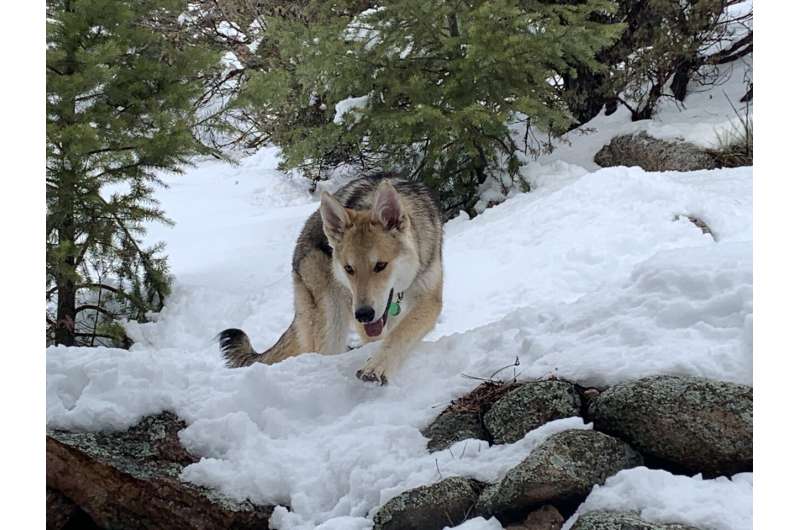This article has been reviewed according to Science X's editorial process and policies. Editors have highlighted the following attributes while ensuring the content's credibility:
fact-checked
trusted source
proofread
Gut bacteria found in wild wolves may be key to improving domestic dogs' health

Gut microbes found in wild wolves may be the key to alleviating a debilitating gastrointestinal condition common to domestic dogs, according to a study led by researchers at Oregon State University—Cascades.
In a paper published in Applied Microbiology, the authors report a novel strain of Paenibacillus bacteria with characteristics of a probiotic—an organism that conveys a health benefit to the host.
In this case, the benefit would be to head off canine inflammatory bowel disease, a chronic illness characterized by vomiting, reduced appetite, weight loss, flatulence, a rumbling stomach and/or abdominal discomfort, said Bruce Seal of OSU-Cascades' biology program.
"At present there is no known cure for this ongoing dysbiosis of the gastrointestinal tract, and there are limited options for treatment," Seal said. "Underlying causes of the condition include an animal's genetics, environmental factors, the immunological state of the GI tract and, maybe most importantly, an altered gut microbiome."
The research, a collaboration between scientists at OSU-Cascades and Oregon State's Carlson College of Veterinary Medicine, is an important step toward a dietary supplement or food additive capable of steering the composition of a dog's gut microbiome back toward that of the wolf, with which it has common ancestry.
"Dogs were the first domesticated animal," Seal said. "The modern dog diet, high in carbohydrates, does not reflect a wolf's diet—for example, starches in processed dog food are resistant to digestion, and that can have a negative impact on the microbial community in a dog's GI tract and in turn its gastric physiology."
In this study, gastrointestinal material was collected from a dead wolf one day after it died from injuries sustained from being struck by a car. The scientists isolated 20 different gut bacteria that preliminary genetic analyses indicate have probiotic qualities, and for this paper they performed whole genome sequencing on a novel Paenibacillus strain.
The bacterium encodes enzymes that can digest complex carbohydrates such as starches, Seal said. It also has gene systems expressing antimicrobials.
"Non-toxic, spore-forming bacteria promote anti-inflammatory immune responses in the gut and inhibit pathogen growth," he said. "Taking everything into account, this bacterial isolate could be a potential useful probiotic for domestic dogs."
Seal added that the researchers plan to perform whole genome sequencing on four or five other bacterial species among the 20 isolates.
More information: Jennifer McCabe et al, Phenotypic and Draft Genome Sequence Analyses of a Paenibacillus sp. Isolated from the Gastrointestinal Tract of a North American Gray Wolf (Canis lupus), Applied Microbiology (2023). DOI: 10.3390/applmicrobiol3040077
Provided by Oregon State University




















